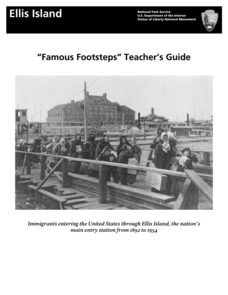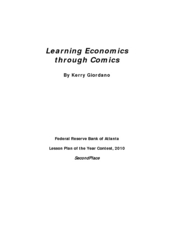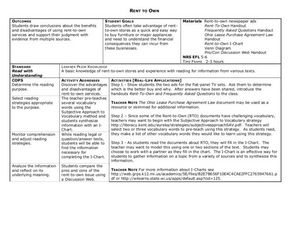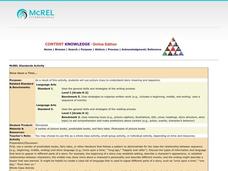Museum of Disability
Looking Out for Sarah
Perry the dog is Sarah's best friend and her guide to the visual world. Young readers learn about guide dogs and communication with Looking Out for Sarah by Glenna Lang, through a series of discussion questions and activities.
Federal Reserve Bank
Saturday Sancocho
What does stew have to do with bartering? Learners will find out how by reading the story Saturday Sancocho, discussing the text, participating in a bartering activity in class (once with goods only and once with money), and discussing...
National Endowment for the Humanities
The Poet's Voice: Langston Hughes and You
Middle schoolers complete a unit of lessons that explore the poetic voice of Langston Hughes. They define voice, read and analyze various poems by Langston Hughes, and complete journal entries for each instructional activity.
MENSA Education & Research Foundation
Hurricanes
Learn the ins and outs of hurricanes through a series of lessons answering, "What is a hurricane? How does it travel? How is one formed, measured, and named?" Information is presented through informative text and images, while...
National Park Service
“Famous Footsteps” Teacher’s Guide
As part of a study of Ellis Island Immigration Station, class members assume the role of immigration service workers, investigate the dossier of an immigrant, and recommend whether or not their subject should be allowed to enter the US....
Benjamin Franklin Tercentenary
The Junto Meets Again
Out of the classroom and into the streets! With Ben Franklin’s Junto society as inspiration, learners develop their ideas for improving their communities and put them into action. After analyzing meeting notes to discover what the Junto...
Curated OER
Learning Economics through Comics
Students summarize the historical development of money. In this economics lesson, students describe the process of bartering and explain how money facilitates trade and exchange. Students also define and describe inflation and a modern...
Curated OER
Rent To Own
Reading can be a good way to learn about many different things, like rent-to-own housing programs. Learners read informational resources about rent-to-own programs and how they work. They complete graphic organizers using the facts they...
Curated OER
Faith And Service
Eighth graders recognize the connection between their religious faith and social responsibility. After a lecture/demo, student groups complete a worksheet imbedded in this plan, then create posters depicting community service.
Federal Reserve Bank
Financial Fables: Shopping Wisely with Olivia Owl
Cover two subjects with one lesson! First, dive into English language arts; read an eBook, answer comprehension questions, and complete a cause and effect chart about the financial fable, Shopping Wisely with Olivia Owl. Then, take a...
Code.org
The Cost of "Free"
Explore the trade-offs of using a free app. The fourth installment of a 12-part unit helps young consumers discover the cost of receiving a free service. They learn how these apps make use of their access to data.
NET Foundation for Television
1850-1874 Notable Nebraskan: J. Sterling Morton
What are the characteristics of an outstanding citizen? Nebraskan J. Sterling Morton contributed to the formation of societal and family values in his state. Learners gather information on Morton's life accomplishments from primary...
Maryland Department of Education
The Concept of Diversity in World Literature Lesson 4: Proverbs
"Eneke the bird says since men have learnt to shoot without missing, he has learnt to fly without perching." As part of their study of Things Fall Apart, class members read Paul Hernadi and Francis Steen's essay, "The Tropical Landscapes...
BioEd Online
Muscle Fibers
What better way to learn about muscle than by dissecting one? Using cow muscle (beef), learners compare bundles of yarn to muscle fibers as they explore each. The supplemental reading about astronauts losing muscle mass in space and what...
Maryland Department of Education
The Concept of Diversity in World Literature Lesson 1: Unit Introduction
To launch a unit study of the concept of diversity in World Literature, class members compare Chinua Achebe's essay, "An Image of Africa: Racism in Conrad's Heart of Darkness" and Richard Rodriguez's essay, "The Chinese in All of Us: A...
Federal Trade Commission
Ad Awareness
Movie theaters, shopping malls, television, the Internet ... no matter where people go, they are inundated with advertisements. Scholars discuss the topic of ad awareness using the first of four Admongo lessons about advertising. Pupils...
Curated OER
Once Upon a Time...
Model for emergent readers how to write a story by interpreting picture clues. For guided practice a second book is used, and then pupils work independently or with an adult to write their own stories based on illustrations.
Channel Islands Film
Restoration Channel Islands Debate
Introduce learners to the debate format with an activity that uses the National Park Service's controversial Channel Islands restoration program as a topic. Class members learn how to generate provocative debate questions, how to prepare...
Nemours KidsHealth
Germs: Grades 6-8
As part of their study of bacteria, viruses, fungi, and protozoa, middle schoolers create engaging public service announcements for preschool and kindergarten classes, teaching them how and when to wash their hands. To begin, class...
BioEd Online
The Skeleton
Don't be chicken to try a lesson plan that compares the anatomy of birds to humans. Read the background information so you don't have to wing it when it comes to the anatomy of a chicken. Prepare cooked chicken bones by soaking them in a...
Baylor College
Defending Against Microbes
In the preceding activity from the unit, beginning biologists discovered that microorganisms are everywhere, so the question follows, why are we not sick all of the time? Class members read and discuss an article in small groups about...
Curated OER
Human Cloning: Is it Biological Plagiarism?
Is cloning good or harmful? Help your class understand the risks and benefits as they read, research, and discuss human cloning. Individuals form teams, research information, and present to the class before concluding with an in-depth...
Baylor College
Plant Parts You Eat
Plants provide a variety of delicious foods essential for human survival. In the fourth lesson of this series on food science, young scientists investigate common fruits, vegetables, and grains in order to determine which plant part is...
Baylor College
Water: Post-Assessment
Very simply, the science class will discuss what they have learned during The Science of Water unit and take a multiple-choice post-assessment quiz. A few other closing activities are suggested for you to choose from, such as having...

























